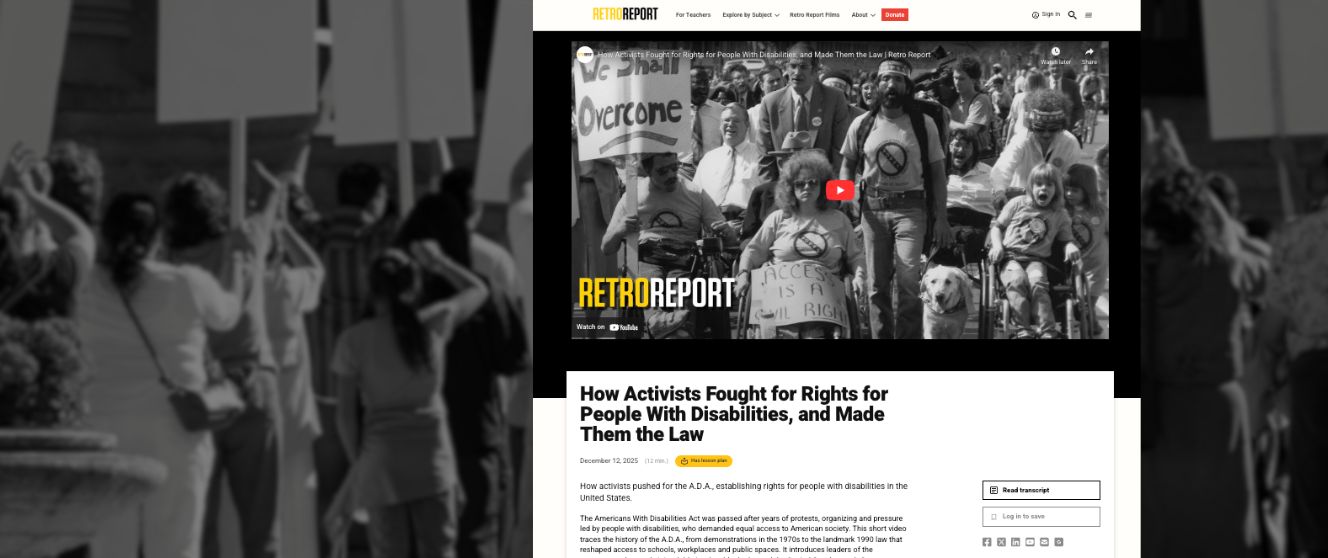
For Immediate Release:
March 27, 2025
WASHINGTON, DC – The U.S. Department of Health and Human Services (HHS) is undergoing cuts of about 20% of full-time personnel and a massive restructuring in the name of “efficiency.” Whether you read about these proposals in a news article, read HHS’s press release, fact sheet, or heard about it from Secretary Kennedy himself, there is no question that the proposed changes will hurt critical services and the civil rights of people with disabilities of all ages.
Getting healthcare delivery is complicated in the United States. Getting the long-term care services and supports (LTSS) needed by many older persons and people with disabilities is equally complex, and further complicated because the population that needs LTSS is subject to barriers of discrimination and lack of accessibility in education, employment, housing, transportation, and healthcare.
HHS’s Administration of Community Living (ACL) was created over a dozen years ago to help manage funding and coordination for LTSS across HHS’s 28 divisions and foster cooperation with state and local government agencies and non-profit organizations. Anyone who has been involved in helping a spouse or an elderly relative stabilize after a fall or health event or who has worked to get LTSS in place for a disabled child or sibling knows what people with disabilities know: LTSS is hard to get and hard to maintain. Proper nutrition, personal care assistance, accessible housing, medical devices, and caregiver support cannot ever be taken for granted. The right of disabled persons to live in their communities was recognized by the U.S. Supreme Court’s 1999 landmark decision in Olmstead v. L.C., but ACL helped to make the right a reality.
HHS’s announcement that it is cutting 28 divisions to fifteen, laying off 20,000 workers, and closing half of its ten regional offices may sound efficient at first, but in practice, it means that more people will not get the services they need when it counts. People with disabilities may be discharged without local housing to go to, they may lack needed equipment or accessible features if they have a home to go to, and they may face daily gaps in personal care assistance or food because coordinating agreements aren’t entered and payments aren’t timely made. These things happen now because LTSS coordination is hard. And the problems will happen more with this restructuring. And the proposed centralization in all of HHS of “Human Resources, Information Technology, Procurement, External Affairs, and Policy” means that people with disabilities and disability advocates will probably not even have these negative changes tracked or the data to argue for more resources and attention.
The elimination of ACL, in favor of a brand new Administration for a Healthy America (AHA), purports to harmonize health programs and resources for low-income persons, with divisions on primary care, maternal and child health, mental health, environmental health, and others focused on coordinating chronic care and disease prevention programs. Once again, people with disabilities and chronic conditions are relegated to primarily inhabiting a category to be avoided. A “rising tide” of health for everyone is a lovely vision, but rising tide theory and policies tend to leave behind those who don’t already fit a pre-existing concept of being healthy and free of disability. The ACL was founded because people with disabilities and aging adults needed interagency initiatives such as the National Support Strategy to Support Family Caregivers, and communities needed technical assistance to truly include people with disabilities of all ages, including people with disabilities of color, LGBTQ+ individuals, and immigrants. Increasing wellness across the lifespan for everyone is an excellent goal and does not need to come at the expense of disabled persons, but in this HHS restructure, they will.
HHS also plans to have a new Assistant Secretary for Enforcement to “provide oversight to the Departmental Appeals Board (DAB), Office of Medicare Hearings and Appeals (OMHA), and the Office for Civil Rights (OCR) to combat waste, fraud, and abuse.” DREDF notes that civil rights is not intended to combat waste, fraud, and abuse. It might be considered “efficient” in a dystopian society to let a disabled child languish without education in a nursing home, have an elderly person lose their home because they can’t afford to get accessibility features installed, and deny medical treatment to an adult with disabilities because they have a low quality of life in the opinion of a medical provider, but it is not civil rights enforcement.
Ultimately, DREDF believes these changes in HHS will increase waste, fraud, and abuse. We will see more wasted lives of people with disabilities as they face increasing barriers to community-based living, the greater abuse of people with disabilities who will be walled behind institutions or simply left homeless. and fraudulent promises from a current administration that simultaneously threatens social security payments, civil rights enforcement, Medicaid, and the stability of our country’s entire healthcare ecosystem from rural hospitals to veteran’s benefits.
Press Contact:
Tina Pinedo, Communications Director
Disability Rights Education and Defense Fund
510-225-7726
media@dredf.org
# # #
Disability Rights Education and Defense Fund (DREDF), based in Berkeley, California, is a national nonprofit law and policy center dedicated to advancing and protecting the civil and human rights of people with disabilities. Founded in 1979 by people with disabilities and parents of children with disabilities, DREDF remains board- and staff-led by members of the communities for whom we advocate. DREDF pursues its mission through education, advocacy, and law reform efforts, and is committed to increasing accessible and equally effective healthcare for people with disabilities. DREDF supports legal protections for all diversity and minority communities, including the intersectional interests of people within those communities who also have disabilities.


